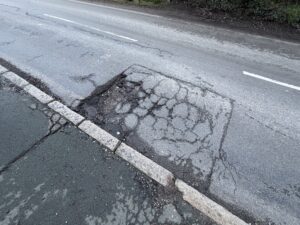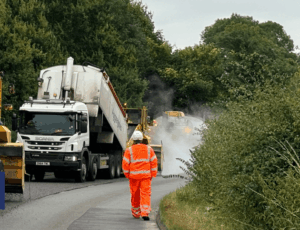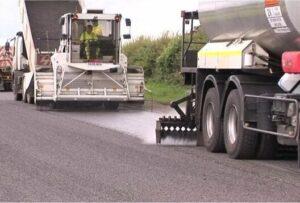Whatever the outcome of the upcoming Spending Review for roads, the investment should be focused on preventing potholes forming in the first place and a reduction in reactive repairs to reduce inefficiencies, according to Paul Boss, Chief Executive of the Road Surface Treatments Association (RSTA).
He was responding to a Local Government Association (LGA) statement that said over 9.5 million potholes could be repaired or prevented by councils with the funding lost from local road maintenance budgets this year – the equivalent of 64,000 repairs in every local council area.
The LGA has said that overall capital funding allocated to councils for local road maintenance in 2021/22 by the Department for Transport is £1.39 billion – a reduction of £400 million (22 %) from the previous year. In order to allow councils to try and tackle the £10 billion backlog of local road repairs, the LGA said the Government should use the Spending Review to plug this year’s £400 million gap and commit to an additional £500 million per year to councils for road repairs. This would bring the total annual local roads maintenance budget to £1.8 billion.
Mr Boss said: “We wholeheartedly agree with the views of the LGA, although focus should be heavily weighted to preventing potholes forming in the first place as they are incredibly inefficient to repair on a reactive basis and starve finance from much more efficient preventative and structural maintenance programmes.
“The Comprehensive Funding Business Case developed by DfT with the UKRLG / ADEPT Asset Management Board and submitted to Government for consideration as part of the Comprehensive Spending Review (CSR), clearly sets out the sustainability and efficiency gains that can be achieved whilst improving the local road network to the benefit of all direct and indirect users of the same. We cannot stress how important the additional, sustained funding is to improving people’s lives and making a recovery from the effects of the pandemic, both mentally and economically to the nation.”
The LGA said fixing roads is a top priority for councils, with a pothole repaired every 19 seconds despite the COVID-19 pandemic requiring teams to work hard to introduce temporary road measures. It said that In recent years the Government has supported local roads maintenance, including a Pothole Repair Fund, recognising the importance of resilient and well-maintained highways infrastructure to all road users and businesses.
The cost of construction has also increased significantly, reflecting global supply problems. Future capital allocations should take into account the significant inflation rates in highways construction and maintenance costs.
Cllr David Renard, Transport spokesperson for the LGA, said: “The ability of councils to improve local transport connectivity and infrastructure, including upgrades to local bus, road and cycle infrastructure, is critical to government ambitions to level up the country, reduce carbon emissions from transport, and support our long-term economic recovery from the pandemic.
“Councils are working hard to keep our roads safe and resilient, repairing potholes as quickly as they can. However, it would already take £10 billion and more than a decade to clear the current local roads repair backlog, with the COVID-19 pandemic and subsequent cancellation of key planned works risking extending this backlog further.
“With long-term and consistent investment in local road maintenance in the Spending Review, councils can embark on the widespread improvement of our roads that is desperately needed, to the benefit of all road users up and down the country, including cyclists.”
The results of the CSR will be announced by Government on the 27 October.
























